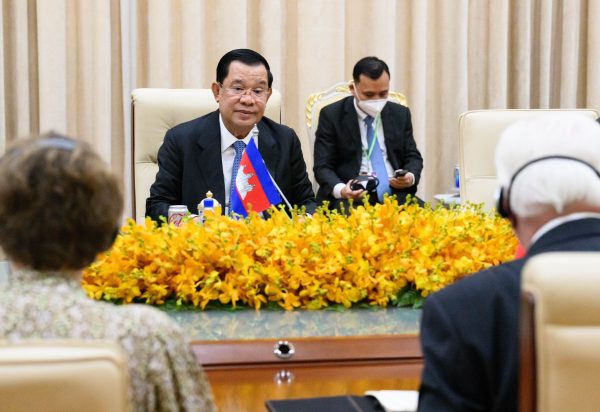But Hun Sen is only 70 or 71 years old and appears to be in reasonably good health. There is no reason to think that he will disappear from the scene any time soon.
There are, however, some indications that he is planning to hand control of Cambodia to his eldest son, Hun Manet, the 44 year old general and commander of the Royal Cambodian Army. This handoff could occur sooner than expected — perhaps following the July 2023 elections in which Hun Sen will almost surely further cement his and the Cambodian People’s Party’s (CPP) grip on power.
Any handoff to Hun Manet will be carefully managed, with Hun Sen likely to remain CPP President. Either way, US and allied officials would be wise to begin considering how this transition will play out, as well as what Cambodia with Hun Manet — and eventually without Hun Sen — will look like.
And while there is no guarantee that Hun Manet’s ascension will go smoothly given Cambodian youth displeasure with his father’s governance, the Hun clan is currently riding a high: people credit Hun Sen for effectively managing the COVID-19 crisis, engineering two successful meetings with US President Joe Biden and maintaining a positive economic trajectory.
The chance that Hun Sen’s handover to Hun Manet will prompt significant public outrage in the short term is thus somewhat low. There will certainly be displeasure in Phnom Penh, where the country’s democratic-minded elite are based. But close to 80 per cent of Cambodians are subsistence farmers more concerned with the provision of public goods than the concept of democracy.
The pliability of Cambodia’s majority could enable a smoother transition to Hun Manet. Yet the princeling remains likely to face some opposition from CPP elites who want power for themselves or their children. When Hun Sen said in December 2022 that Hun Manet would succeed him, leaders like Interior Minister Sar Kheng and Defence Minister Tea Banh hesitated to offer their endorsements.
Hun Sen may have promised CPP leaders that their children would receive plum posts in the next generation of Hun clan leadership. The government has already replaced former agriculture minister Veng Sakhon with Dith Tina, the son of Supreme Court justice and Hun Sen backer Dith Munty.
More generational promotions seem likely after the Hun clan and the CPP sweep to victory in July 2023. These moves could perhaps quell some internal party challenges to Hun Manet, although not all officials will be satisfied. Hun Sen himself may also struggle to step away from the only post he has known for nearly four decades.
Still, some foreign officials are already beginning to hedge their bets by building ties with Hun Manet: the commanders of the Australian and New Zealand armies met with him in October 2022.
But if it is relatively clear that Hun Manet will eventually rule Cambodia, it is unclear how he will do so. There is a long-held notion that Hun Manet — who attended the US Military Academy at West Point, New York University and the United Kingdom’s University of Bristol — will be more friendly to the West and its partners than his father. While that might be somewhat true, it is hard to imagine that Hun Manet will fully reorientate Cambodia in the way the West might like, particularly if Hun Sen remains influential behind the scenes.
The fact remains that if Hun Manet comes to power, he will have done so in a nondemocratic way. This makes it difficult for any US administration to rebuild ties with Phnom Penh, given long-running congressional frustration with the Hun clan. It will be difficult for Hun Manet to extend an olive branch to Washington and its allies, particularly if human rights violations and Chinese developments at the Ream naval base continue.
In the long term, though, Western policymakers will likely find Hun Manet a preferable partner to his father. Hun Manet has no personal or historical disdain for the United States, suggesting a greater potential for partnership than there has been with Hun Sen.
But because Hun Manet lacks the charisma and political legitimacy of his father, he will likely focus on issues that could garner him popular support — like economic development and the provision of public goods. That focus will probably lead him first to China, which has long provided economic and developmental benefits to Hun Sen’s government in exchange for geopolitical support. Yet Hun Manet could also attempt to better balance Beijing and Washington in order to extract economic benefits from both.
There is, then, a chance that Hun Manet could shift Cambodia’s foreign policy in a direction resembling that of Malaysia or Thailand, which welcome Western investment while also remaining close partners of Beijing. But this best case scenario assumes that Hun Manet can overcome the historic troubles of patrimonial successions and that the United States will be able to overlook the nondemocratic nature of his ascension. Neither development seems particularly likely.
US and aligned policymakers should nevertheless do what they can to bring such a situation into reality. It is surely better to lay the groundwork for the best in Cambodia than to simply expect and accept the worst.
Charles Dunst is the author of Defeating the Dictators: How Democracy Can Prevail in the Age of the Strongman(Hodder & Stoughton, 2023) and an Adjunct Fellow (Non-Resident) with the Southeast Asia Program at the Center for Strategic and International Studies in Washington DC.
A version of this article was first published here at CSIS on 13 January 2023.

